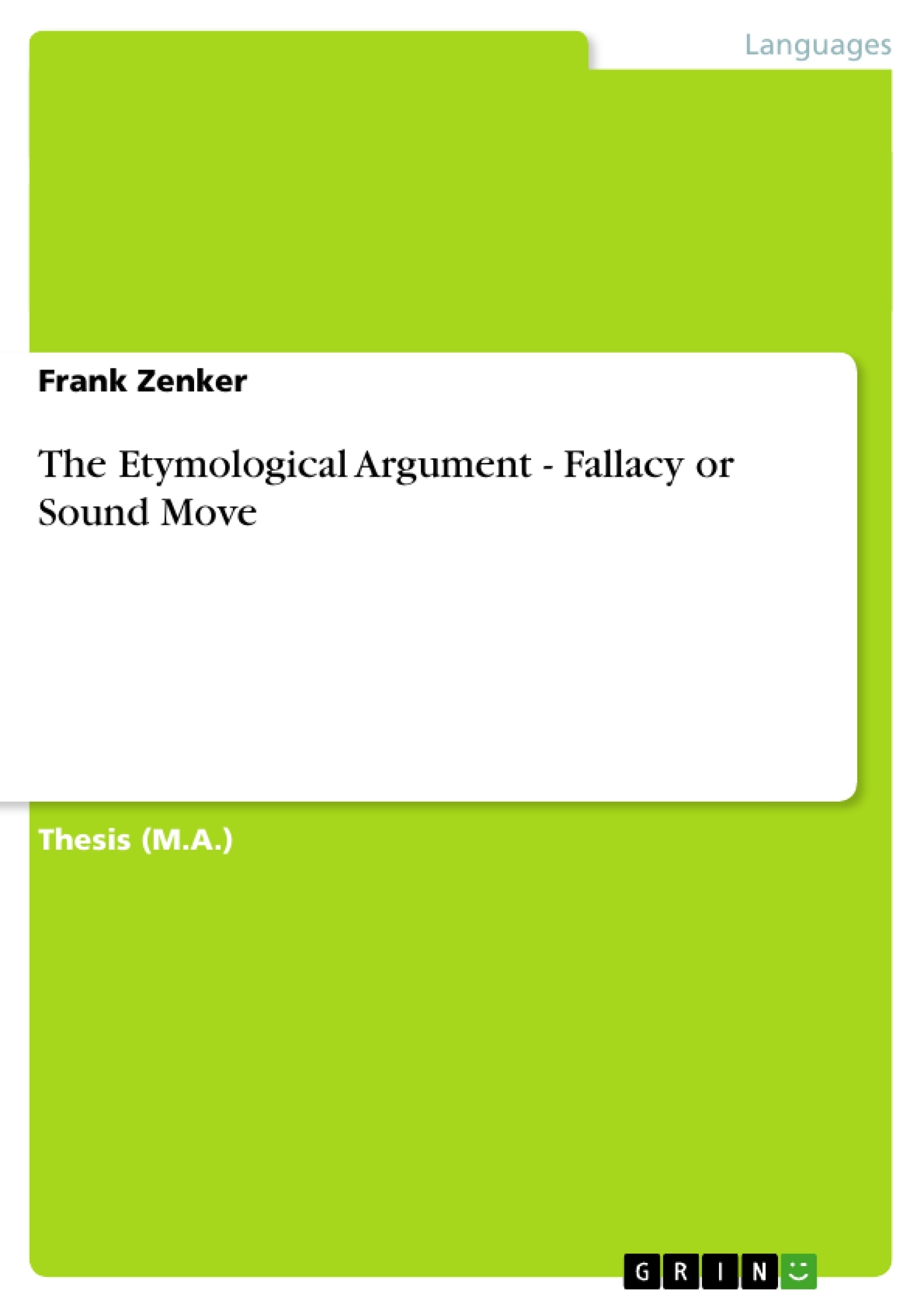This text is concerned with the place of etymology as an argument in a critical discussion according to the Pragma-Dialectic model. My thesis is a criticisms of the etymological argument for an ontological presupposition of essences beyond the observable real world that seem necessarily implied in forwarding etymology as a means to formulate and justify definitions of key-terms.
The research spells out criteria of fallaciousness and, eventually, suggest that all essential definitions are to be avoided or mitigated so that no ontological import takes place, but the essential method instead assumed as functionally equivalent to the Aristotelian method of defining according to the genus proximum and differentia specifica scheme to get rid of the ontological problem, at least.
The criticism of essentialism used is the German-Englishman Karl Popper′s forwarded in The Open Society which is published, in English, at the end of the second world war in criticism of the European totalitarian political excesses at that time. It is a modern criticism that I bring in relation to the comparably relevant, yet somewhat older postulation of an arbitrary relation between the linguistic form and its meaning by the French linguist Ferdinand Saussure in his Course in General Linguistics, published by students in 1915.
Popper′s criticism is, in his full intent, also a criticism of the methods of 20th century Social Sciences and Humanities in contrast to the Natural Sciences. I try to give this discussion some room but will disappoint anyone who reads the text for a statement on the methods debate. Its centrality is pointed out, though.
I make ample use of notes that distract a smooth reading substantially, especially as I decided to use endnotes. The first reading should be exercised in complete disregard of the footnotes. This way, you get what is in the text. The second should include the endnotes. This way you get to where I come from and it is the level at which criticism should find its most fruitful soil.
′Essentially, what you do in parliament is talking. Parliament. Look at the French word parler - to talk. There you have it′.
From a discussion on a Netherlands Radio Station, July 2002
[...]
Table of Contents
- Preface
- Introduction
- Etymology and the Meaning of Terms
- Distinction from Conceptual History/ Cultural Studies
- Opinions about the Etymological Argument/ the Etymological Fallacy
- Divergences of the Meanings of Terms
- The Term-Meaning Relation: Dynamic versus static Meaning
- Etymology in Argumentation. From historical Meaning to lived Praxis
- An illicit Reasoning Scheme for the Etymological Argument
- Evaluation of the Etymological Argument
- The modern Status of Etymology after Saussure
- Popper's Criticism of ontological Platonic Epistemology
- Implications: Key-Terms, Meanings and Definitions
- The Use of Etymology for the Purpose of Giving a Definition
- Fallacy Criteria for the Etymological Argument
- Conclusion & Outlook
- References
- Notes
- Graphics
Objectives and Key Themes
This thesis investigates the role of etymology as an argument within the framework of the Pragma-Dialectic model. It critiques the etymological argument, arguing that it relies on an ontological assumption of essences beyond the observable world. The research outlines criteria for fallacious etymological arguments and ultimately proposes that all essential definitions should be avoided or mitigated to prevent ontological implications. The criticism of essentialism is rooted in Karl Popper's ideas presented in "The Open Society," published at the end of World War II, and is linked to Ferdinand de Saussure's proposition of an arbitrary relationship between linguistic form and meaning.
- The role of etymology as an argument in the Pragma-Dialectic model
- The criticism of the etymological argument for its reliance on ontological assumptions
- The development of criteria for fallacious etymological arguments
- The proposal to avoid or mitigate essential definitions to prevent ontological implications
- The connection between Popper's critique of essentialism and Saussure's proposition of an arbitrary relationship between linguistic form and meaning
Chapter Summaries
- Preface: This section provides an overview of the thesis's main argument and research focus, highlighting the critique of the etymological argument for its ontological presuppositions. It emphasizes the importance of avoiding essential definitions and the use of Popper's criticism of essentialism and Saussure's theory of linguistic form-meaning relation.
- Introduction: This chapter presents a real-world example of an etymological argument and introduces the concept of etymology as an argument within a Pragma-Dialectical framework. It raises the questions of justifiable use of etymology in arguments and the criteria for evaluating its soundness.
- Etymology and the Meaning of Terms: This chapter delves into the concept of etymology and its relationship to terms and meanings. It discusses the distinction between etymology and other fields like conceptual history and cultural studies, examines various opinions on the etymological argument and the etymological fallacy, explores divergences in term meanings, and investigates the dynamic versus static nature of the term-meaning relationship.
- Etymology in Argumentation. From historical Meaning to lived Praxis: This chapter focuses on the use of etymology in argumentation, particularly the potential for illicit reasoning schemes.
- Evaluation of the Etymological Argument: This chapter critically examines the etymological argument, considering the influence of Saussure's linguistic theories and Popper's critique of essentialism. It discusses the implications of these theories for key terms, meanings, and definitions, explores the use of etymology in defining terms, and establishes criteria for evaluating fallacious etymological arguments.
Keywords
The primary focus of this thesis lies in the examination of the etymological argument within a Pragma-Dialectical framework. The key concepts include etymology, argumentation, fallacies, essentialism, ontological presuppositions, and the relationship between linguistic form and meaning. The discussion draws upon the theories of Saussure and Popper, emphasizing the importance of avoiding essential definitions and the limitations of the etymological argument.
- Quote paper
- Frank Zenker (Author), 2002, The Etymological Argument - Fallacy or Sound Move, Munich, GRIN Verlag, https://www.grin.com/document/6971




